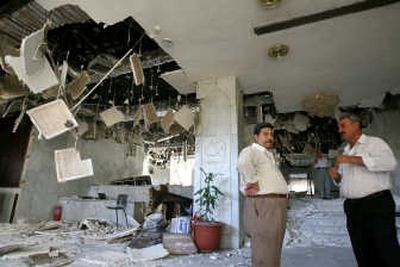U.S.-friendly Sunni leaders killed

BAGHDAD – In a deadly setback to the U.S.-led war, unknown assailants detonated a large bomb at a major hotel just outside the Green Zone on Monday, killing key members of a Sunni anti-al-Qaida alliance that is cooperating with U.S. forces.
The bombing occurred shortly before noon in the tightly protected Mansour Hotel on the west bank of the Tigris River, where Sunni tribal leaders from Anbar Province west of Baghdad were meeting.
The blast, widely attributed to a lone suicide bomber, ripped apart thick slabs of marble from the walls and caved in the lobby’s ceiling.
Although investigators still are examining the scene, a source familiar with explosives said a single suicide vest or belt was unlikely to cause such damage. The source noted that the age and condition of the building could have been a factor in the devastation.
At least six members of the Anbar Salvation Council were among the dozen killed, and they included Sheik Fassal al Gaood, a council leader and former governor of Anbar province, and Rahim al Maliki, a well-known poet as well as a producer at state-run al Iraqyia TV. Three of al Gaood’s bodyguards reportedly also were killed, and at least 18 Iraqi civilians wounded. There were no American casualties.
This is the first assassination of Sunni sheiks since they openly turned against al-Qaida in Iraq last September, but some of the top tribal leaders such as al Gaood were offering to cooperate with the American military as long as two years ago.
The U.S. military has been nurturing alliances with Sunni tribal leaders – former foes of the Shiite dominated Iraqi government but now a key element in a series of initiatives to pacify the country. With the troop buildup complete and 150,000 U.S. forces in place, American and Iraqi forces last week began widespread ground-air operations in provinces north and south of Baghdad.
Asked why crucial U.S. allies were not provided with tighter security, Lt. Col. Christopher Garver said it was “an Iraqi event.” The sheiks did not seek to hold their conference in the fortified Green Zone, but they were more than welcome to do so, he said.
“Added security may be our response” should other Sunni sheiks hold similar conferences, said Garver, adding that the sheiks, police and government officials at the hotel were “attacked for working within the system and trying to make life better” for Iraqis.
A 21-year-old hotel worker who identified himself as Ahmed said the explosion blew off the doors of the Mansour’s Al Khaiyam bar. “I was about to open the door of the bar when it happened,” he said. “There were some concrete columns which protected me.
“I saw organs of the suicide bomber,” Ahmed added, saying the attacker positioned himself near al Gaood before the detonation.
After the Mansour blast, Iraqi officials sealed off the hotel. Like many hotels in the capital, the Mansour uses armed guards and car checkpoints.
No group immediately claimed responsibility for the attack. At least one government official suggested it was an inside job.
Mahmoud Farhad Othman, one of Iraq’s three ministers of state, said he believed “people in the hotel” were involved, noting that suicide attacks are a hallmark of Sunni terrorist organization al-Qaida in Iraq.
“I think the situation shows there needs to be more security,” Othman said. While he said Monday’s blast – and security lapse – could discourage Sunni tribal leaders from cooperating with U.S. and Iraqi officials, he hoped “it may encourage those to be more enthusiastic about participating to help defeat terrorists.”
U.S. Army spokesman Lt. Col. Scott Bleichwehl said the bomber was “someone who logically had close access,” adding that the attack “highlights how dangerous (national) reconciliation is to terrorists.”
Earlier this month, al Gaood said, his home outside Ramadi was destroyed, his cars burned and his life threatened by al-Qaida. They killed five of his bodyguards.
He had been imprisoned under Saddam’s regime and two of his brothers were killed.
Despite his involvement in the nascent peace efforts, he predicted violence would return to Anbar and elsewhere, and advocated for a strong-arm government over democracy.
“Iraq is marching toward the edge of a valley,” he said. “Daily killings, kidnappings and bodies in the street.”
Al Gaood is believed to have kept a residence at the Mansour, a high-end hotel that houses members of Iraq’s Parliament, the Chinese Embassy, and several Western news organizations. Al Gaood and the other sheiks killed in the bombing were high-value targets for insurgents seeking to derail U.S. and Iraqi government security plans. Others killed in the bombing included Sheik Abdul-Azizi al Fahdawi, Sheik Tariq Saleh al Assafi and Col. Fadil al Nimrawi.
The attack was among five suicide and other bombings Monday, from Mosul and Beiji in the north to Hillah in the south that killed at least 45 people.
In an unrelated incident, the U.S. command reported a U.S. soldier was shot to death Monday in south Baghdad.
Suicide bombers killed at least 13 Iraqi police officers in the attack on a joint U.S.-Iraqi security station in Beiji, 155 miles north of Baghdad, the U.S. military command said.
At least nine other Iraqis reportedly were killed at the scene and 21 were wounded.